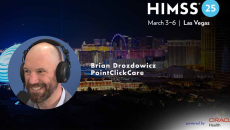Operations
HIMSS25
While AI can fix clinical documentation efficiency, traditional interventions such as improving culture can be another solution to physician burnout, says Dr. Anwar Jebran, medical director of population health informatics at Oak Street Health.
Garner Health helps employers shift from reacting to healthcare issues to proactively managing them. Kirk Czonstka, SVP of strategic alliances, says the right data can dramatically improve how healthcare costs are controlled.
HIMSS25
While AI technology shows promise for automating administrative tasks, Julie Frey, vice president of provider product at Wolters Kluwer, recommends caution in deploying AI, particularly generative AI, for clinical use cases.
HIMSS25
While decentralizing healthcare data using blockchain can potentially bolster organizations' cybersecurity, Matt Murren, CEO of True North ITG, cautions that quantum computing may one day crack blockchain's ciphers.
The company's filing comes two months after fellow digital musculoskeletal care company Hinge Health filed for IPO.
It is a transformation, not just a move, because it is a fundamental difference in the way systems run in the data center, says Jeff Thomas, senior vice president and chief technology officer, Sentara Health.
HIMSS25
Dr. Guido Giunti, chief data officer at Dublin, Ireland's St James's Hospital, studies healthcare trends to predict coming changes and then tailors messages about those changes to address audiences' concerns and encourage buy-in.
HIMSS25
Cybercriminals invest heavily into developing new attacks, so Eric Liederman, CEO of CyberSolutionsMD, recommends that healthcare organizations take a proactive security stance and build strong resilience and recovery plans.
HIMSS25
While the change of administration means federal regulations and funding remain in flux, PointClickCare's Brian Drozdowicz believes healthcare vendors and organizations are making strides in improving interoperability.
HIMSS25
While telehealth remains popular with patients after the pandemic, Scott Wilson, AVP of enterprise care solutions at Teladoc, warns that issues around regulation and payment may present barriers to its continued growth.









